
Table of Contents
Japan’s Q-STAR propels quantum technology’s worldwide affect, emphasising sensible purposes and prioritising collaboration and societal difficulty-resolving.
Q-STAR (Quantum STrategic business Alliance for Revolution) was established in Japan in September 2021 to create new industries and small business possibilities primarily based on quantum technological know-how. Its members appear from numerous organization sectors, which include startups, modest and medium-sized enterprises, massive corporations, and tutorial institutions.
Q-STAR proactively collaborates with organisations in various fields globally, transcending business and company boundaries to develop the quantum technological know-how-connected business enterprise of the future.
We have set five missions to reach our aim:
- Construct a society where by the use of quantum is for absolutely everyone — by 2030, 5-10% of the population in main produced nations around the world will be making use of quantum technological innovation
- Boost the globalisation of quantum technological know-how — advancing the development and software of quantum technologies as a result of global co-procedure along with accelerating financial globalisation
- Help business enterprise possibility generation by implementing quantum technologies — help the participation of quantum sellers and customers in the undertaking business enterprise industry, expanding the scope of the quantum field
- Endorse the quantum marketplace by education human resources and greatly disseminating info — creating a programme to recruit and prepare staff in quantum and linked fields, producing it crystal clear that implementation of quantum is crucial for the long run and
- Encourage industrialisation by means of the collaboration of business, authorities, and academia collaboration — we propose a discussion board, Quantum United, for sector-government-academia collaboration for a variety of nations around the world
We emphasise far more on making company with quantum instead than academically researching quantum engineering.
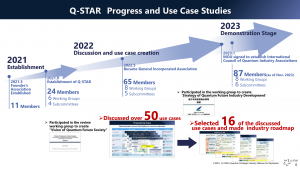
How are quantum systems used so significantly?
Our target is not basically on the implementation of quantum know-how but on its creation and the creation of a path to a future that features peripheral industries. We believe that we can boost the social implementation of quantum by broadening the scope of our routines to contain quantum-influenced systems and hybrid environments with existing laptop systems.
At present, Q-STAR has 6 subcommittees and 8 doing the job groups. Subcommittees are creating use scenarios, and functioning teams are offering practical info to subcommittees. Q-STAR now has 87 members (as of November 2023), several of which are user companies. This is the most important attribute of Q-STAR. These user corporations proactively take part in the subcommittees with seller corporations to develop use instances.
To date, Q-STAR has talked over in excess of 50 quantum-know-how use scenarios, selected 16 of them to be adopted up on as the next move, and created their industry roadmap.
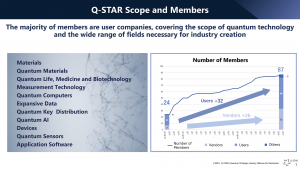
We use the quantum reference architecture design for industrialisation (QRAMI) as a instrument for the standardisation of use scenarios. QRAMI was impressed by RAMI 4. as a design for viewing quantum organization. It envisions the whole quantum-associated domain on the a few axes of domain, architecture, and know-how, assisting to create quantum use situations. We goal to make it a world wide resource, a platform for prevalent knowing, not only within Q-STAR but also with other industrial consortiums about
the globe.
In this way, placing use instances to sensible use is the essential to making use of quantum know-how to culture more quickly. We count on to increase the technologies to numerous industries, these kinds of as healthcare, finance, logistics, factories, transportation, etc.
The upcoming of quantum know-how
The upcoming we look for is to clear up the present concerns in culture with quantum technological know-how. We are trying to locate means to use quantum know-how to fix these difficulties. In addition, we intention to direct the world in quantum industry firms and want to carry quantum technological know-how to the life of 5-10% of Japanese citizens in the in close proximity to future.
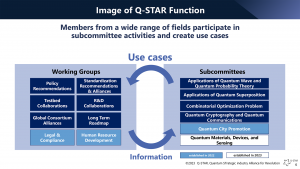
We take into account the subsequent as the principal worries to employing the technologies socially:
- Early linkage and demonstration of quantum technological know-how with classical pc engineering
- Raising experience of actual equipment use and user-driven proposed use conditions and
- Creating benchmarks/requirements
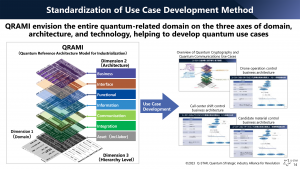
Q-STAR’s attempts to remedy these concerns
Q-STAR emphasises collaboration amid sectors this sort of as authorities, academia, and marketplace. Not long ago, Q-STAR member corporations, reps of academia, and countrywide institutes outside the council have been discussing an open up program platform that is not dependent on the variety of quantum computer system. The plan listed here is to visualise a hierarchy extending from consumer problems to numerous calculation methods, and to establish a speculation for functional use as a system.
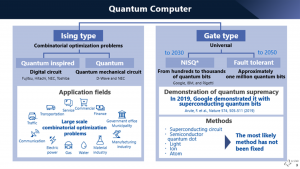
Additionally, Q-STAR signed an MoU with a few other overseas consortiums, this sort of as QED-C (United states of america), QuIC (Europe), and QIC (Canada), to establish a collaborative relationship.
The quantum marketplace is nevertheless in its infant stage of enhancement. As for gate-variety quantum desktops, it may well take a long time for social implementation to be realised. Having said that, as for ising-style pcs (also referred to as annealing-type desktops) and quantum-motivated desktops, they have already been shifting to the demonstration phase, and cases of their apps are starting to arise.
Quite a few technologies can be merged with quantum know-how. It is Q-STAR’s role to acquire these merged technologies and make business enterprise possibilities with them.
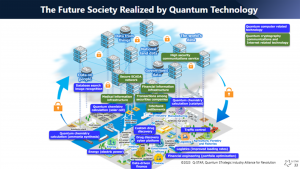
Be sure to take note, this report will also seem in the sixteenth edition of our quarterly publication.





